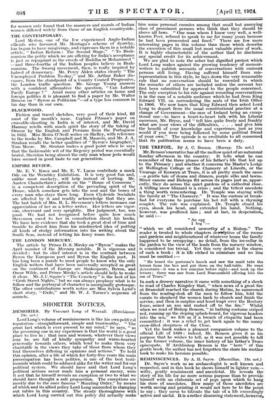SHORTER NOTICES.
Lord Long's volume of reminiscences is like his own politcal reputation—straightforward, simple and trustworthy. " The great fact which is ever present to my mind," he says, " as the governing one in my experience is that the world is a good place to live in that men and women, -whatever their views may be, are full of kindly sympathy and warm-hearted generosity towards others, which tend to make them very charitable in the views they take of those from whom they find themselves differing in opinions and actions." To hold this opinion, after a life of which for forty-five years the main preoccupation has been politics, is one of the best testi- monials which could be adduced alike for the writer and for our political system. We should have said that Lord Long's political actions never made him a personal enemy, were it not that he himself reveals an exception or two to what we should have thought a safe proposition. The exceptions are mostly due to the once famous Muzzling Order," by means of which and its allied policy Lord Long succeeded in stamping out rabies in this country. The steady thoroughness with ,which Lord Long carried out this policy did actually make
him some personal enemies among that small but annoying class of prominent persons who think that they should be above all laws. " One man whom I knew very well, a well- known Peer, refused to speak to me for many years because he had been prosecuted and fined." There are few more interesting pages in this volume than those which describe the execution of this small but most valuable piece of work. It is highly characteristic of the author that he disclaims any special credit for its achievement.
We are glad to note the sober but dignified protest which Lord Long makes against the growing tendency of memoir- writers to publish accounts of conversations with eminent persons still living. Having suffered himself from mis- representation in this style, he lays down the very reasonable rule that no conversation should be recorded in which the remarks of others are included unless the account has first been submitted for approval to the people concerned. The only exception to his rule against recording conversations is in the case of a notable audience which he had from King Edward VII. on surrendering the seals of the Irish Office in 1906. We now learn that King Edward then asked Lord Long to depart from the usual constitutional practice at a change of Government--the case of Ireland being an excep- tional one—to have a heart-to-heart talk •with his Liberal successor, Mr. Bryce, and " tell him quite freely and frankly what are your views of the difficulties, . . . and give him the benefit of your knowledge and experience, just as you would if you were being followed by some political friend of your own." The episode is so creditable to all concerned that its publication seems to have been a duty.










































 Previous page
Previous page